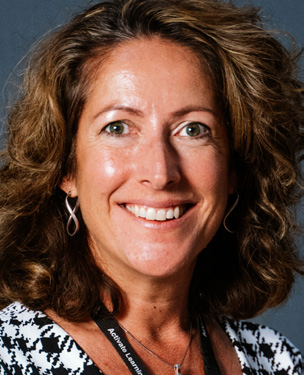FST JOURNAL
The Skills Gap
DOI: https://www.doi.org/10.53289/WHYQ4110
The Further Education perspective
Nancy Buckley

Nancy Buckley is Group Director of Business Development at Activate Learning, one of the largest education groups in the UK. Activate Learning runs seven colleges in the Oxfordshire, Berkshire, Surrey region. It also sponsors ALET, a multi-academy trust of schools including UTC Reading and is the lead partner for UTC Oxfordshire in Didcot. It offers 20,000 places for learners in vocational and academic education (as well as adult education courses). It has a focus on apprenticeships (including upskilling existing workforces), lifelong learning and T-Level qualifications (the technical equivalent of A Levels). Lifelong learning includes apprenticeships, Access to HE and funded courses for older people.
I am not a teacher but I entered the world of Further Education to bring employability skills and a business profile into the college. I am still doing that today, bringing employers into the college to meet students and talk to them about all the different careers that are available to them. We have seven colleges in Activate Learning. We are an apprenticeship training provider, we have an online platform as well as some international operations.
Following primary and secondary school, it becomes the FE world's job to look after many 16-plus learners. We usually only have them with us for two or three years. It is sometimes only at the age of 16 that the students get to practise and hone the habits and skills that they will need in the vocation they have chosen to study.
Pathways
There are several pathways for a student in post-16 education. They can continue with A levels, usually in sixth form or at a college. They can study various vocational programmes, undertake apprenticeships or they can now opt for a T level.
This is a technical qualification equivalent to three A levels, but in a particular vocational subject area such as engineering or digital technologies. Essentially, the T level encompasses a core of technical qualification time at college, which can be anything from 20-50%. For example, with a hospitality T level, there will be a generic cookery skills unit in year one, with a specialism in baking or butchery in year two. That all takes place in the college.
The real differentiator is the industry placement, which can be anything between 315-420 hours over the length of that programme – around 45 days on a job placement with an employer.
T levels have been developed by employers, universities and colleges in partnership with the Government to provide the skills that employers need. The first T levels have been developed in digital technologies, in construction, health, education and childcare. Activate Learning has around 300 students on these courses, with the majority in the health sector.
We find placements for them with our local NHS hospitals and services. The course also includes additional elements including Maths and English if they have not already achieved their Level Four qualifications. Even if they have, we keep giving them Maths and English challenges, because that is still so important.
We believe T levels are an exciting new qualification and they certainly seem to be gaining recognition and popularity – and that is true for both parents, learners and employers.
Our philosophy aims to bring together the brain, the emotions and the motivation. So we encourage our students to practise repeatedly, to read and research and develop their knowledge. We work with them on the motivational aspects and on their whole emotional psyche to give them the confidence to go out and be successful.
Underpinning our approach is the goal of developing the whole person. When I visit employers and talk to them about placements, they are not so interested in the technical qualification that a student might come out of college with – they can provide that training themselves. What they are really interested in is a student that has some resilience, somebody that is professional, turns up on time, is dressed appropriately and can get themselves to work and keeps returning. Not all 16-year olds have those skills but they need to develop them.
 Industry placements are the key to the T level and are where students get a taste of the real world. After two years at home during the pandemic it is often the first time they have been in a professional space.
Industry placements are the key to the T level and are where students get a taste of the real world. After two years at home during the pandemic it is often the first time they have been in a professional space.
Placements
Industry placements are the key to the T level. This is where students get a taste of the real world. The 16-year olds that are in college now have probably had two years at home during the pandemic where they did not even get to school to socialise and meet with people. For some of them, walking into an office or an engineering workshop would be the first time they have been in a professional space.
We have 300 students studying T levels in health, engineering, digital sciences and business. One whole class of students goes to John Lewis/Waitrose in Bracknell, 40 students go to Oxford University Hospital and six are at BMW. We have to ensure that the placements are of high quality, and that they are of benefit both to the students and the employers.
It is not a simple task finding employers that will take on a student. It is, after all, no small ask for a busy employer to have a 16-year old there every week, finding meaningful tasks for them to do. We also have to ask the employer to assess the students’ performance, that they are doing the right thing in the workplace while contributing to their learning as well. So ensuring the consistency of industry placements is really important.
We have to check that the students are arriving on time. Those attendance issues are relatively easy when they are coming into college, but we also have to check their arrival at 30 or 40 different placements. We have to help educate our employers about looking after younger people than they ordinarily have within their workplace. So, teachers need to help educate both students and employers.
Colleges have to be innovative in using alternative delivery methods to get across our teaching as well. Upon completion of the T level, just like A levels, students can go on to university if they wish, or undertake further technical training qualifications such as a higher level apprenticeships. Others choose to go straight into employment. Some of the students that have been out on placement are getting interviews with the employers about taking on a full-time role with them once they finish their education, which is fantastic to see.
We see the T level as a really important option in Further Education. There are still some challenges to be addressed. But we are working very closely with the Department of Education and other partners to make sure the lessons being learned are feeding back into the development of these qualifications.
